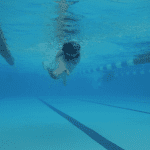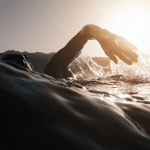
Tips for multi-day swimming challenges
How to get through multi-stage races, training camps or swimming holidays
If you are doing several races over a weekend (e.g. Aquamasters in Turkey) or a staged swim over several days, like UltraSwim33.3, it’s not only cumulative fatigue you have to contend with. You need to fuel your efforts, avoid injury, stay healthy and protect your skin. Here are a few tips on how to do it. These are also useful if you’re on a swimming holiday or training camp.
Nutrition and fuelling
Nutrition concerns the meals you eat between swims. Fuelling is what you do to maintain your energy levels while swimming and to support your recovery immediately after.
Between swims, aim to eat real food you are familiar with and know shouldn’t cause any gut distress. Compared to my regular diet, I increase carbohydrates and reduce bulky vegetables, fatty and high-fibre foods. If you replace most of the calories you burn while swimming with your fuelling, you shouldn’t need to bulk up your meals.
If your swims are more than about an hour, you should have a fuelling plan based on easy-to-digest carbohydrates. Energy gels are easy to carry and convenient but not to everyone’s taste. Alternatives are dried fruit bars, bananas (best taken from feed stations rather than carried), jelly babies and Jaffa cakes. Test anything you plan to use in advance. Immediately post-swim, consume a recovery drink or eat a light meal with protein and carbohydrates.
Remember to keep hydrated too. Consider an electrolyte drink, especially if it’s warm or you’re prone to cramp.
Protect your skin
Find out where you’re susceptible to chafing and be generous with anti-chafing creams. Consider using a neck protector if you’re swimming in a wetsuit. Men, do you need to shave? A bristly chin will soon rub your arm or shoulder sore. Use sunscreen too, especially for your face, neck, shoulders and upper back.
Conserve energy between swims (but stay mobile)
Allow your body to recover between swimmers but don’t seize up. Gentle walking and light stretching should help. It’s good to get plenty of sleep too but don’t panic if you don’t. Not everyone sleeps well between swims. Try at least to rest and stay relaxed.
Avoid injury
Pay attention to aches and niggles. If you can, deal with them before they become worse. Some multi-stage events offer massage and physiotherapy services. Take advantage of them if you can. In the run-up to the event, do what you can to improve your technique to reduce injury risk. You can also do prehabilitation exercises to strengthen your shoulders. Speak to a physiotherapist who understands swimming if you have any concerns.
Accept it will be hard
You will have tough patches. They are easier to deal with if you’re prepared for them and have planned a coping strategy. If you have an energy slump, adjust your pace but keep going. You may bounce back. Eat or drink something if you can. If conditions get rough, stay calm and keep going. Perhaps they will improve when you round the next headland.
Be flexible with your goals
If your original plan gets derailed – for example, if you have to pull out of a swim – it doesn’t necessarily mean game over. Regroup, reflect and set a new goal. Is there a way you can still do the next swim? Find a way to stay involved and enjoy the experience.
Break big swims into chunks
The thought of a big swim is daunting. You may hope to finish it but can’t see how. Instead, you could start by telling yourself you’ll swim to the first feed station (or other waypoint) and then reassess. I’ve started swims before with no intention of completing them, and then managed to finish anyway by swimming one section at a time.
Save something for the next swim
Even though you have time to rest and recover between swims, you will not recover completely. The harder you push on one swim, the more tired you will be at the start of the next. If you’ve still got swims to do, keep something in reserve.
Keep smiling
However tough it gets, remember that you’ve chosen to be there, and you are privileged to be there. Make the most of it. Remember, the harder you find it, the more satisfying it will be at the end.
Main image (c) UltraSwim33.3 / Crutchet









